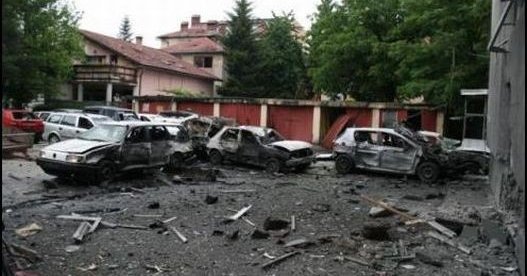One police officer was killed and five more were injured after 15 kilos of explosives were detonated at the police station in the Bosnian town of Bugojno on 27th June. The suspects for the attack, later arrested, were identified as members of the radical Islamic wahhabic movement. The reported reasons for the attack were “pointing to the injustice to Muslims” and a protest against the “contamination” of Islam in Bosnia.
Yet only two decades ago religious fundamentalism in Bosnia and Herzegovina was an unknown phenomenon.
The Islam traditionally practiced by the Bosniak (Bosnian Muslim) population is moderate, permeated with a strong awareness of the country’s multiculturalism and complicated history. The old families of Sarajevo allegedly still heed the custom of attending all religious services on major holidays, regardless of denomination, and it is quite possible to have Muslims wishing their Catholic neighbours a merry (Orthodox) Christmas. For centuries, this plurality has been crucial to the constituent people’s identities, as well as to the identity of Bosnia and Herzegovina.
The 1990s, however, saw the first Saudi-financed charitable religious organisations springing up in the war-torn country. Despite being vehemently opposed by some local imams, denounced as a “fundamentalist sect”, and cleared from the Bočinja village by NATO forces in 2000, the wahhabists now have their hub in Gornja Maoča/Karavlasi, an isolated village where no “outsiders”, apart from the police, are allowed.
The laws of attraction
What is it that made those – young – men join a movement based on religious extremism, intolerance and violence in a country itself ravished by violence mere decade and a half ago, but a country to whose survival throughout the centuries tolerance had been essential?
The question is, what is it that made those – young – men join a movement based on religious extremism, intolerance and violence in a country itself ravished by violence mere decade and a half ago, but a country to whose survival throughout the centuries tolerance had been essential? (Alternatively: how come these youths found membership in a cult more attractive than, say, membership in JEF’s Bosnia and Herzegovina section?)
There is no simple answer, as “simple” just doesn’t apply to Bosnian reality: the wounds are still fresh, and the scars passed onto generations too young to remember the war. The three constituent peoples obey their own respective gravities, which go hand-in-hand with their passports – Croatian for Bosnian Croats and Serbian for Serbs, along the BiH ones – with the Bosniaks left with “only” the BiH passports like a consolation prize. After December last year this impression was only reinforced, with the Serbian nationals joining Croats in the select Schengen visa-free group: in theory, the citizens of Bosnia-Herzegovina were still subject to Schengen visa regulations; in practice, it was only the Bosniaks that effectively ended up being second-class. Without the arche-mothers of either Croatia or Serbia to turn to, Bosniaks have taken on the role of proverbial orphans “stuck” with Bosnia and Herzegovina, which is, following this metaphor, apparently to be seen as an evil step-mother.
In a country where being Christian Orthodox means “Serb”, Catholic “Croat” and Muslim “on one’s own”, Saudi “assistance” in the shape of staff plus cash directed at setting up religious centres in Bosnia at the time of its greatest traumas may have been seen by some as a welcome helping hand from outside. And if you see this generous hand as your only ally in a newly-shattered world, it is, apparently, somewhat easier to get over the whole “smite the infidels” bit.
The aftermath
The last thing Bosnia needs is to have its whole Bosniak/Muslim population identified as Islamist fundamentalists. Though not very likely to happen, there are always political forces seizing every opportunity to increase tension between the constituent peoples and call for country’s further disintegration. What such calls result in is further Bosniak isolation, proven to be fertile ground for radicalisation. Radicalism was the reason behind the attack of 27th June – and several previous ones – the target of which was the very state of Bosnia and Herzegovina, its institutions and their legitimacy. We have a name for such attacks – terrorism. And that is no longer a Bosniak problem, or a problem of the governing entity of the Federation of Bosnia and Herzegovina, but a problem of Bosnia and Herzegovina, and, ultimately, of Europe. As long as BiH seems to be coming apart at its Dayton seams, it will remain a suitable wahhabic nest: close to the “West”, yet under the radar – a threat not only to the region, but well beyond.
What it takes to prevent it is, firstly, strong political will and motivation from all Bosnian citizens, regardless of denomination or passport, for Bosnia and Herzegovina to be recognised as a sustainable country and not a waiting-room; and secondly, insisting on the European identity of Bosnia and Herzegovina and the EU as its primary and true ally – one that doesn’t promote violence in exchange for its friendship, but also one that doesn’t favour some nationalities over others when distributing privileges. A timely EU candidacy would grant this volatile country motivation and means for stabilisation, and a viable alternative to the dispersion of half its population between Croatia and Serbia and “the rest” being left to their own devices and “help” from friendly fundamentalists with not-so-friendly methods.


Follow the comments: |
|
